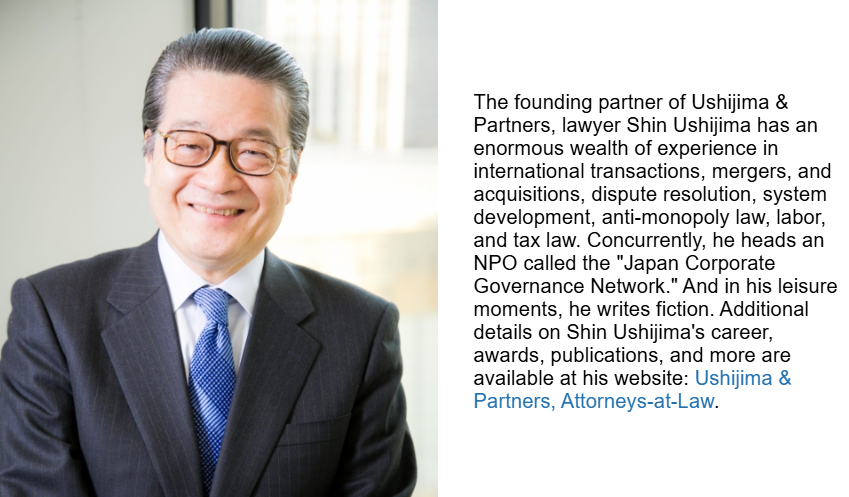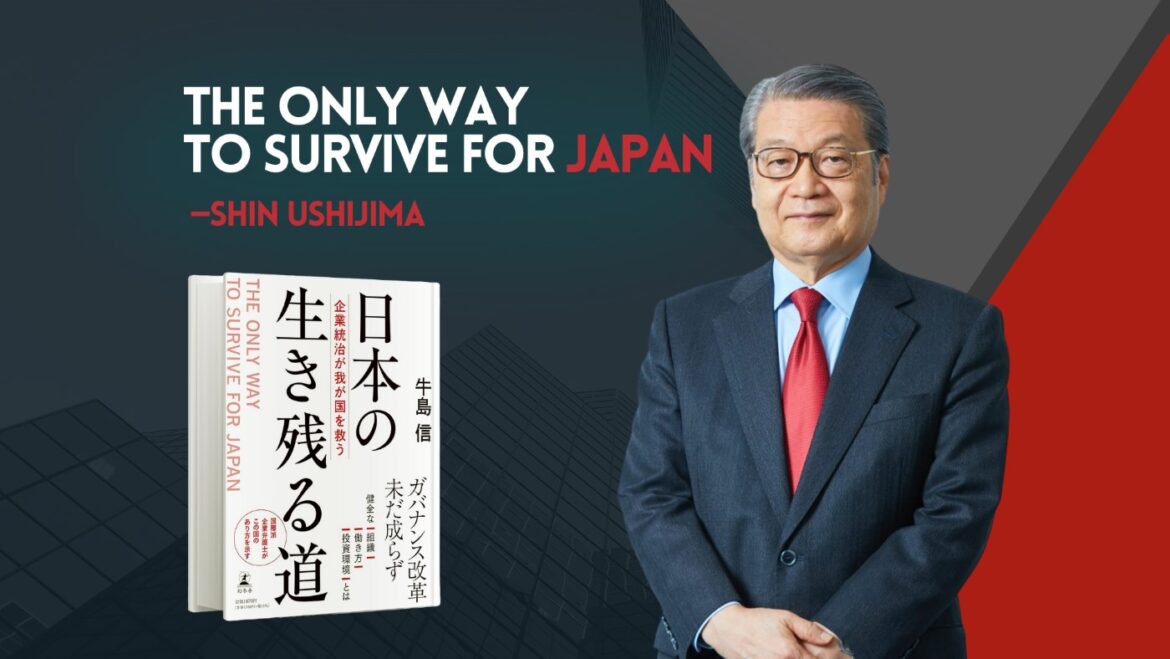Join us in reading this book, The Only Way to Survive for Japan, subtitled “Corporate governance is sure to save our country.” Although this book mainly focuses on corporate governance, it broadly covers outside contributors and governance as a whole. Peppered with real-life examples of successes and failures, the book is also a primer on the rules and cautions of corporate governance in Japan.
Find all published chapters at ‘The Only Way to Survive for Japan’
Read the seventh and last part of Chapter 1:
Is ‘The Lost Three Decades’ Lurching Toward the Lost Five Decades?
The Corporate Governance Code will be amended.
As revised, the Code demands that companies listed on the Prime Market have independent outside directors as at least one-third of their directors.
Currently, Japan is facing an unprecedented economic crisis under the corona pandemic, which is largely attributable to the lack of sufficient “earnings power” of many Japanese companies. Would this problem be solved if independent outside directors increased in number?
As is evident, independent outside directors are not empowered to run the company. It is the president and his/her management team that actually manipulates the organization.
Therefore, the president, which is such an important position, should be chosen from among the most suitable of the candidates. And independent outside directors should involve themselves in the decision to select the president, thereby fulfilling their vital role and manifesting their raison d’etre.
As a matter of course, shareholders select directors, and directors select the president. But I recommend that a practical rule be established where independent outside directors choose the candidates for both inside directors and outside directors. Concretely speaking, it is a nominating committee, which is mainly composed of independent outside directors. What is desirable is a system under which the president has information about the candidates but is required to persuade the independent outside directors when culling the successor from them. Many presidents should have great confidence in their persuasion skills.
Steps to Selecting Candidates
Independent outside directors choose candidates for independent outside directors; if this practice is repeated a certain number of times, independent outside directors are sure to have a stronger influence on selecting the successor to the president. Along with the development of such an environment, the practicality of independent outside directors increasingly carries weight. Whether they comprise a majority or not is just secondary. I wonder how many independent outside directors there are who are practically useful and helpful. Which should come first, the number or their practicality? I do not mean to bring up a chicken and egg situation here, though.
Whatever it may be, nobody can be certain that this alone could help overcome the unprecedented economic crisis. There is no knowing whether we will be able to find a way to prevent the “lost three decades” from continuing into the lost four decades or even into the lost five decades. In order to get a helpful suggestion of what to do about it, we are planning to invite intellectuals including Mr Sōichirō Tahara, a political journalist, to express their opinions through the Internet in the near future. It is a serialized talk show of the special project directed by the Corporate Governance Network.
Mr Sōichirō Tahara has willingly accepted our request to join the talk show as its first guest.
(The Kihou Corporate Governance dated June 2021)
Outside Directors and the Media
In Japan, the judicial function still leaves a lot to be desired, so the role of the media is “decidedly large.”
It is makurakotoba (枕詞: literally, Pillow words) I use when I start talking with people from the media.
As I am daily involved in legal proceedings, it is close to home for me.
Especially, I would have to say that it is only the media that are expected to discipline outside directors.
It has been a long time since the practicality, or effective use, of outside directors has been considered important. But I wonder whether any concrete and persuasive discussion over how outside directors should be disciplined is being conducted in an effort to further the practicality of outside directors. I would have to say that the reality is that unless they live by the theory of the goodness of human nature, outside directors would rest on the theory of “ignorance is bliss” figuring that they would hardly be held liable for what they are not informed of.
How Much Say is Too Much?
Often, I hear the complaint that the president is the one who actually selects outside directors in reality. I am not saying that the candidates for outside directors should be presented to the general shareholders meeting for its resolution without any involvement by the president. It is desirable for the management including the president to participate more or less in the process of selecting outside directors. But what is unfortunate is that they have too big a say in the selection.
It would be difficult to expect the outside directors chosen in such a manner to hold a sufficient level of independence.
If, however, a set of effective discipline is established for outside directors, an outside director, although he/she is actually selected by the president, can be expected to speak and act on his/her own, freed from the shackles of the president. Once a person becomes an outside director, he/she has to shoulder personal responsibility for his/her acts and deeds. What they are greatly concerned about may be whether or not their reputations and honor are smeared.
The Role of Media
Now, I would like to go back to the role of the media mentioned in the opening.
If a scandal occurs in a company, not only the president should be held liable, but also outside directors are individually held accountable for it. They cannot get away with a subterfuge that they are ignorant of any details behind the scandal. If the media reveal without any hesitation the names of such outside directors accusing them of violating the obligation of supervision, it would force the outside directors to straighten up their attitudes and develop a sense of duty.
I believe my view is nothing special and quite standard, but I wonder whether people who have “moderate” views and who may think that I have gone too far constitute the majority of the citizenry.
(The Kihou Corporate Governance dated November 2021)
 Managerial Accountability of Outside Directors
Managerial Accountability of Outside Directors
The practicality of outside directors is increasingly regarded as important. In the face of the recent high-profile cases of applying pressure to the shareholders of Toshiba, the qualitative deception of Mitsubishi Electric Corporation, and the systemic troubles of Mizuho Financial Group, Inc, there is an increasing demand to hold outside directors to account.
It is out of the question just to gather outside directors for making up the number. But in reality, even if outside directors are highly motivated, it often happens that they just stand as a mere formality being left out of the loop. Definitely, they need to be kept up-to-date with information. Such a circumstance is mostly ascribable to both the outside directors and the company.
It may well be that there are many things that outside directors are ignorant of compared to the inside directors because they come from outside the company. Therefore, outside directors should deepen efforts in gathering the information they need. They also need someone to assist them and the company is obligated to help establish an environment for outside directors to have easy access to information. By giving as much necessary information as possible to outside directors, the company can elicit more helpful opinions and advice from them as its advisors/supervisors.
Armed With Information, Play a Central Role in Governance
A nominating committee and a compensation committee which are composed of a majority of outside directors are expected to play a central role. The committees are required to conduct deliberations based on mid- and long-term perspectives. Inside directors differ in this respect, for they are centered on executing their company’s business operations. Outside directors shoulder managerial responsibility in the mid- to long-term through their advice and monitoring functions supporting the executive management.
Courts are beginning to pay attention to corporate governance in response to the report on Toshiba’s scandal produced on the initiative of its shareholders. If there is a suspicion of wrongdoing arising in connection with the execution of the business operations of a company, the shareholders may file a petition with the court for the appointment of an inspector for the investigation. There used to be fewer chances of appointment of inspectors by the courts, but the courts have embarked on a process to lower the barriers to the appointment of inspectors.
Truly competent and helpful outside directors are the linchpin of corporate governance. The day will come before long when judiciary authorities will question the managerial accountability of outside directors.
(The Asahi Shimbun dated March 2022)
The Tortoise’s Pace
I have contributed a series of columns to a national daily for seven years.
As it will come to an end soon, I was asked to comment in an interview about what I had written and I had the opportunity to run through all of the 89 installments all over again.
Surprisingly enough, every installment was interspersed with corporate governance.
The editor said to me, “Well, you had mentioned Mr Ghosn four times before his scandals were brought to light.” He was right, but it may come as no surprise because I wrote about high-profile cases of the time.
After rereading them through, I had the impression that corporate governance of Japanese corporations had gone back and forth over the previous seven-plus years. It is a tortoise’s pace. And it is a tortoise that walks even backward from time to time. But it has been steadily stepping forward from its starting point.
I enjoyed rereading, feeling like taking a small trip down memory lane, and I was convinced that my thoughts and opinions as expressed in my columns might have driven me to commence the special project of the Japan Corporate Governance Network in July 2021.
‘What Japan Must Do’
The special project is titled “The lost three decades; what must Japan do?” But each time the project rolls, it worries me that the three decades may possibly extend into the four decades or even into the five decades; I sometimes notice sad and helpless feelings well up in me. That said, I cannot find words to express my appreciation for those who kindly participated in the project.
My conviction remains unshakable.
“Another Shōin Yoshida is sure to appear in Japan.”
He was the person who had protected Japan from colonization by Western powers at the cost of his own life.
Starting a National Debate
Corporate governance alone is not sufficient as a prescription that will successfully work to prevent the “lost three decades” from occurring again. But as long as we remain under free capitalism, corporate governance should absolutely be one indispensable element. There is no other source than business corporations that can generate profits.
Lately, I am concerned that corporate governance has not yet developed into a national debate although it is being lively debated by the top authorities. My view of the situation is that a consensus on business affairs among the political, bureaucratic and business circles can hardly lead to a social consensus; the voices and circumstances of workers should be taken into consideration.
In the discussion of the practicality of independent outside directors, what I think is important is how to entwine the president, who is the leader, and the employees, who are the followers, with independent outside directors. I say this because I think that any constituent of multi-stakeholders composed of various stakeholders including the shareholders is important.
(The Kihou Corporate Governance dated February 2022)
Follow the book from Chapter 1, as it is published.

 RELATED:
RELATED:
Author: Shin Ushijima
Continue Reading


AloJapan.com